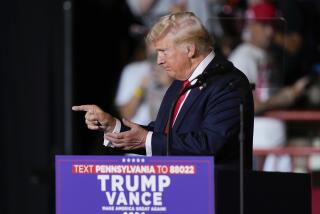Gag Rules Don’t Work
- Share via
As the espionage trial of Richard Miller, the former FBI agent, winds down, it is worth noting that this proceeding has progressed under a gag order issued by Federal Judge David V. Kenyon to stop all lawyers involved in the case from talking to the press. What has this order accomplished?
Kenyon issued the order last March to prevent what he called “a circus show performed outside the courtroom,” a clear reference to the trial of John Z. DeLorean in 1984, where no gag order was imposed and where the defense lawyers gave extensive interviews daily on the courthouse steps. DeLorean was subsequently acquitted.
In the Miller trial, the gag order was issued after the defense lawyers, Stanley Greenberg and Joel Levine, talked about the case in an interview with this newspaper. The prosecution had already publicly discussed its case against Miller at length, but as soon as the defense piped up, the judge ordered everybody to be quiet.
When prosecutors announce indictments, as they routinely do, no one thinks that will make it impossible for the defendant to get a fair trial. But as soon as the defense tells its side, some judges feel a need to clamp the lid on.
Nothing has been gained by the gag order in the Miller trial. The public has been able to follow the daily proceedings in court, but the lawyers have not been able to annotate the courtroom events and explain their strategy. The U.S. attorney got in many licks against Miller before the trial began, but Miller’s lawyers were unable to get equal time.
Most important, there is no evidence to suggest that an impartial jury could not have been impaneled even if all the lawyers had been allowed to speak. And there is no evidence to suggest that, once seated, the jury would be swayed by what is said outside the courtroom.
When the Ninth Circuit Court of Appeals reviewed Kenyon’s gag order in June, it narrowed the order but did not set it aside. But Judge Dorothy Nelson would have thrown out the gag order altogether because, she said, jurors would be influenced only by what they heard in court.
It’s time for state and federal judges to rethink the conventional wisdom about the effects of publicity on juries. The truth is, published interviews with lawyers involved in a case have nothing to do with the quality of justice that the jury dispenses.
More to Read
Sign up for Essential California
The most important California stories and recommendations in your inbox every morning.
You may occasionally receive promotional content from the Los Angeles Times.












